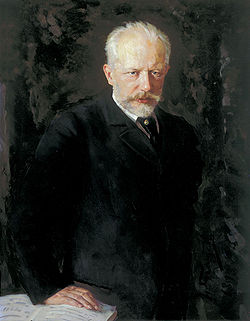Pyotr Ilyich Tchaikovsky 1840 – 1893
March 27, 2009
 Pyotr
Ilyich
Tchaikovsky
1840 – 1893 was a Russian composer of the Romantic era.
Pyotr
Ilyich
Tchaikovsky
1840 – 1893 was a Russian composer of the Romantic era.
Tchaikovsky was an advocate of homeopathy, and he was a friend of Edvard Hagerup Grieg,
Tchaikovsky wrote some of the most popular concert and theatrical music in the current classical repertoire, including the ballets Swan Lake and The Nutcracker, the 1812 Overture, his First Piano Concerto, several symphonies, and the opera Eugene Onegin.
Born into a middle class family, Tchaikovsky’s education prepared him for a career as a civil servant, despite the musical precocity he had demonstrated from an early age.
Against the wishes of his family he chose to pursue a musical career, and in 1862 entered the St Petersburg Conservatory, graduating in
- This formal, Western-oriented training set him apart, musically, from the contemporary nationalistic movement embodied by the group of young Russian composers known as ”The Five”, with whom Tchaikovsky sustained a mixed professional relationship throughout his career.
As his style developed, Tchaikovsky wrote music across a range of genres, including symphony, opera, ballet, instrumental, chamber and song. Although he enjoyed many popular successes, he was never emotionally secure, and his life was punctuated by personal crises and periods of depression.
Contributory factors were his suppressed homosexuality and fear of exposure, his disastrous marriage, and the sudden collapse of the one enduring relationship of his adult life, his 13 year association with the wealthy widow Nadezhda von Meck.
Amid private turmoil Tchaikovsky’s public reputation grew; he was honoured by the Tsar, awarded a lifetime pension and lauded in the concert halls of the world. His sudden death at the age of 53 is generally ascribed to cholera, but some attribute it to suicide.